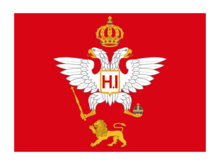Montenegrin National Army
| Montenegrin National Army | |
|---|---|
 The Montenegrin alaj-barjak was the army's flag | |
| Country | Montenegro |
| Allegiance | Independent State of Croatia |
| Engagements | Battle of Lijevče Field |
| Commanders | |
| Supreme Commander | Sekula Drljević |
| Operational Commander | Pavle Đurišić |
Montenegrin National Army[1] (Serbian: Црногорска народна војска / Crnogorska narodna vojska)[2] was an army whose supreme commander was Montenegrin collaborationist politician and separatist Sekula Drljević.[3] When Pavle Đurišić retreated with his forces from Montenegro toward Slovenia in 1945, he made a safe-conduct agreement with Drljević. According to this contract Đurišićs forces were aligned with Drljević as the "Montenegrin National Army" with Đurišić retaining operational command, based on instructions of Drljević.[4]
Background
[edit]Montenegrin National Army was a result of Sekula Drljević's attempts to create an army consisting of Montenegrins who lived outside Montenegro.[5]
Establishment and actions
[edit]On 22 March 1945 Pavle Đurišić signed an agreement with Drljević. According to this agreement the Chetnik 8th Montenegrin Army was agreed to be under Drljevićs supreme command as Montenegrin National Army. On 17 April 1945, after he returned to Zagreb, Drljević issued a proclamation with his political program and invited his "army" to fight both new Yugoslavia and Chetniks of Draža Mihailović.[6]
References
[edit]- ^ Tomasevich, Jozo (1 January 1975). The Chetniks. Stanford University Press. p. 447. ISBN 978-0-8047-0857-9.
There they would align themselves with Drljevic under the name "Montenegrin National Army," with DjuriSic retaining operational command, and would be moved west by rail transport.
- ^ Minić, Miloš (1993). Oslobodilački ili građanski rat u Jugoslaviji 1941-1945. Agencija "Mir". p. 231. ISBN 978-86-82295-01-3.
- ^ Tomašević, Jozo (1979). Četnici u Drugom svjetskom ratu: 1941-1945. Sveučilišna naklada Liber. p. 395.
- ^ Basta, Milan (1986). Rat je završen 7 dana kasnije. OOUR. p. 471.
- ^ Magazine of contemporary history. Institut. 1971. p. 89.
- ^ Magazine of contemporary history. Institut. 1971. p. 88.
